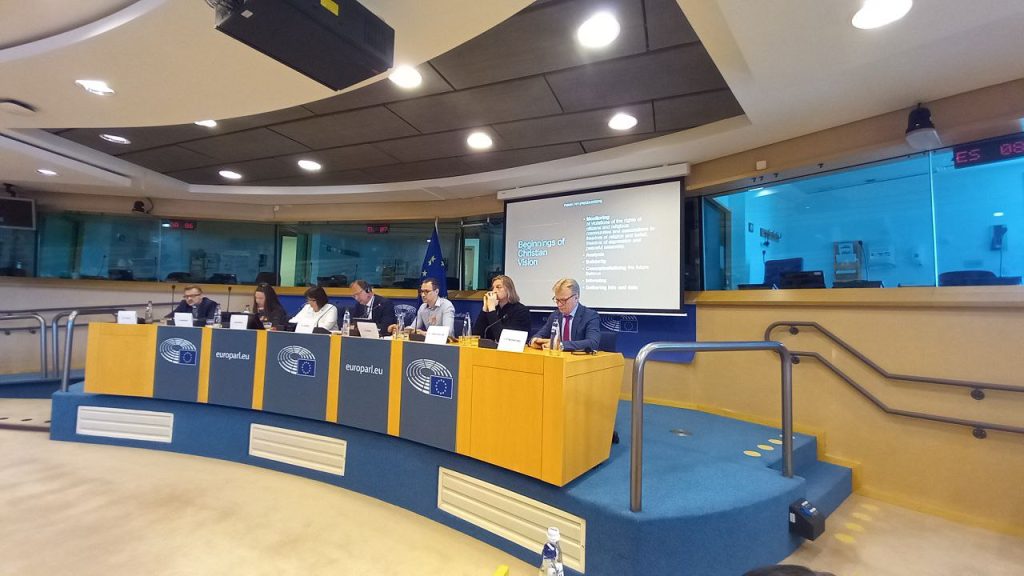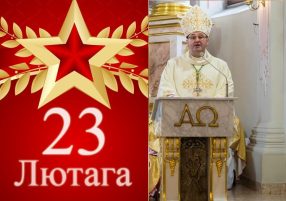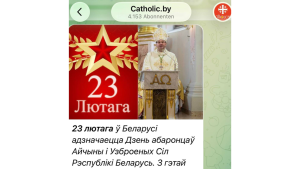Fr. Viachaslau Barok. Situation of the Catholic Church in Belarus in 2020-2023. A story of personal persecution


ВячаслаўБарок
Рымска-каталіцкі святар Віцебскай дыяцэзіі. Душпастыр беларусаў у Варшаве. Блогер.

Life and Faith Under Oppression: Voices from Political Prisoners and the Persecuted Belarusian Christian Communities. Brussels, European Parliament, 31.05.2023.
1. About myself
I have been a priest for twenty-three years. Most of the time I was in Belarus. I have built one church and reconstructed and repaired several more. I have been actively engaged in evangelisation; for that, I organised coach pilgrimages to various sanctuaries of the world, including in Velegrad, Lourdes, Fatima, Santiago de Compostela, for over ten years. Thousands of pilgrims traveled with me across Europe, we all learned about our Christian heritage. We, Belarusians, were reintegrating with Europe, which, as Goethe said once, was built on pilgrimage routes.
When the pandemic shut the borders in twenty-twenty, I set on decorating the territory of our church in Rasony. I planted about a thousand trees and various plants.
All my ministry was aimed at creating the beautiful and just, and promoting peace.
2. About Belarus
As long as I have lived, there has always been persecution on religious grounds in Belarus. The early nineteen-nineties was the only exception. After that, even when there was relative freedom, the Church was always an object of discrimination. Metropolitan Tadeusz Kondrusiewicz expressed the same opinion in his time.
I remember how, at the end of the nineteen-eightees, teachers inspected churches to identify schoolchildren there. I did not suffer much then, however, my oldest sister experienced social isolation, because the school authorities encouraged a boycott of her. Her classmates were forbidden to talk to my sister for Komsomol members were not supposed to communicate with a Christian.
Until today, Belarus is the only country in the post-Soviet space, where the Office of the Commissioner for Religious Affairs has survived. It is the state institution created in the USSR for controlling and limiting the rights of believers.
Still today, the state still gives the Commissioner the the chief bishop’s authority over all religious organisations. It is within his or her competence to decide who is allowed to build churches, pray in them and how.
Back in 2018, the same state-authorised Commissioner demanded from my bishop forbid me to speak and write on social media critisising social injustice.
All this was despite the Constitution of the Republic of Belarus providing for right to freedom of thought and expression in its Article 33.
Still, everything that happened before the fall of 2020 was only a prelude to the open and comprehensive persecution of any manifestation of freedom of thought and the suppression of opinions alternative to ideologically sound ones. Consequently, there were victims: dozens of imprisoned priests and thousands of political prisoners.
3. About 2020
From January twenty-twenty, I started producing a YouTube channel. There, I reflected on the Christian matters in the modern world and discussed the social teaching of the Church.
My activities on social media drew attention of law enforcement agencies. From November twenty-twenty to May twenty-twenty-one, they monitored the content of my YouTube videos looking for criminal materials. They were looking for a reason to initiate a criminal case. They ordered a linguistic examination of ten my videos; it failed to find any crime there. Still, as a preventive measure, I was sentenced to ten days of administrative arrest in December 2020.
My request for the administrative process and the court proceedings to take place in Belarusian were rejected. The Belarusian language is unacceptable in Belarusian courts today.
During twenty-twenty-one, law enforcement agencies staff called me occasionally and asked me more than once if I was still in Belarus. They hinted that I should leave.
And since I didn’t want to keep quiet nor I was leaving Belarus, in July twenty-twenty-two, an administrative case was again opened on trumped-up charges. The prosecutor’s office attempted to take away all my office equipment and phones. One should assume that the authorities wanted to deprive me of the means of producing content for YouTube. I also received an official warning from the regional prosecutor’s office at the same time, I had to leave Belarus in July twenty-twenty-two. Otherwise, I wouldn’t be able to continue my ministry. Having left for Poland, I continue preaching, and until December 2022 I was active on social media.
Lukashenka’s regime did not forget about me. Four YouTube videos where I was taking part were added to its list of extremist materials.
To put pressure on me, representatives of law enforcement agencies visited my father several times In November and December twenty-twenty-two. They questioned him as a witness in the criminal case, however they refused to disclose my status to me.
4. About the prospects of peace and freedom in Belarus
I certainly do not consider myself guilty of violating any laws of the Republic of Belarus.
I have always called for legality, repentance and dialogue.
At the same time, long before twenty-twenty, I predicted the social and political crisis in the country to get deeper.
I argued that without rethinking the atrocities committed under communist rule, state-sponsored terror would inevitably reaccur.
Today, being in the European Parliament, I want to thank you for your interest in the difficult situation in Belarus. Catholic and Nobel Peace Prize laureate, Aleś Bialacki, called the current situation a “civil war”. He used this phrase in his final speech at the court and called on the authorities to stop it.
I will add that the civil war waged by the criminal regime against its own people is taking place in the context of the increasingly pervasive Russian occupation.
Of course, under such external conditions, there is very little hope for freedom of religion. Today, if religious organisations still have the right to exist openly, it is only because Lukashenka’s regime seeks to use churches as means exclusively for its own purposes.
I pray every day that the war and more bloodshed will pass Belarus. However, I also understand that if the world ignores the Belarusian problem, or an attempt is made to base a dialogue on compromises with evil (bargaining, for example, the release of political prisoners for the lifting of sanctions), the opposition in Belarus will only grow. It inevitably will lead to a forceful scenario.
In order for peace to return to Belarus, it is necessary to create a situation in which all those who have committed crimes against Belarusian people will begin to answer for those crimes.
And of course, the help of the whole of Europe is needed here. Belarus is also a part of Europe and the Christian Western civilisation. The responsibility for the fate of Belarus rests not only on the Belarusian people, but also on the whole of Europe.








